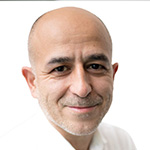TPS-Therapy is an Innovative Development from Shock wave Medicine
Transcranial Pulse Stimulation - Activation of the Brain with Shock waves

Transcranial Pulse Stimulation is a Promising Treatment for Neurodegenerative Diseases
Transcranial Pulse Stimulation is another innovative development from the field of shock wave medicine, which is also consistent with regard to its diverse mode of action. Research into the medical applications of Shock waves has been going on since the 1940s. This is because the high-energy sound waves, as shock waves are also known in everyday life, can influence the behavior of body cells in a variety of ways.
Depending on the intensity of their energy, they have been used in the high-energy range since the 1980s to break up kidney stones and are now standard medical practice in this field. They are also known to have a firm place in orthopedics and are also used, far less well known, in cardiology, urology, dermatology and other medical disciplines.
The fact that they have now also found their way into the treatment of neurodegenerative diseases is only logical and consistent, because: Our cells act and communicate both biochemically (this is where drugs come in) and electrically, i.e. one can support cells of the human (and of course animal) organism in an activating, regulating and regenerating way with sound impulses.
The fact that today we can treat people with Alzheimer’s dementia – and in the future certainly other neurological diseases – with Transcranial Pulse Stimulation is mainly due to a physician whose pioneering work and development of Transcranial Pulse Stimulation cannot be appreciated enough: Henning Lohse-Busch, MD, a specialist in physical and rehabilitative medicine. It was he who recognized the potential of extracorporeal shock waves for neurological rehabilitation as early as the beginning of the 1990s and treated patients in a vegetative state, with incomplete paraplegia and spastic movement disorders under clinical conditions with fascinating results. Analogous to the further development of the technical modules for the use of low-energy shock waves for therapy on or in the brain, Alzheimer’s and Parkinson’s patients were added from 2012.
Multi-center clinical studies under the direction of Dr. med. Lohse-Busch and Prof. Dr. med. Roland Beisteiner, Head of the Faculty of Neurology at the Medical University of Vienna, which were realized starting in 2014, finally led to the CE approval of transcranial pulse stimulation in August 2018.
However, two more years of preparation time passed before the first clinics and practices, including Prof. Dr. med. Musa Citak as one of the first users, began to work with Transcranial Pulse Stimulation on an outpatient basis. In the meantime, however, Transcranial Pulse Stimulation is expanding rapidly, and rightly so, thanks to its good results, and Prof. Dr. med. Musa Citak may be counted among the leading users with the most extensive expertise in practical application.
Note:
Science and research are working intensively and extensively on studies and investigations of transcranial pulse stimulation – not only in relation to Alzheimer’s and dementia, but also to many other neurodegenerative diseases. Clinical papers are now published almost monthly, confirming the evidence of TPS more and more clearly. On the first German-language information portal on neurostimulation “Alzheimer Science” you will find from now on always up-to-date all scientific news on TPS and related topics:
How does Transcranial Pulse Stimulation work and what are its characteristics?
The shock waves or sound waves are extremely short and low-energy pulses that are delivered non-invasively, i.e. transcranially (this means “through the top of the skull”) into the brain. Transcranial pulse stimulation uses only low-energy shock waves. These energies are so low that there is no tissue heating in the brain and the action potential of the shock waves is purely activating and regenerative in nature.
In contrast to other physical methods, this shock wave method makes it possible for the first time to precisely apply these activating impulses up to eight centimeters deep in all brain regions.
TPS therapy shows encouraging data in science and practice
The studies published to date on transcranial pulse stimulation (TPS) – there are now around 21 studies and observational studies, with a further 15 studies currently underway at renowned universities worldwide – confirm what has been observed in clinics and practices for around three years: The shock waves of TPS can have the effect of driving the memory network and increasing memory performance. It can also lead to improved physical activity, and improvements in mood and a reduction in anxiety have been documented both clinically and in practice. Being able to achieve this with a therapy could be a real milestone in terms of treatment options for Alzheimer’s dementia and hopefully soon for many other neurodegenerative diseases, even if a great deal of scientific work is of course still needed to bring these results and observations to a recognized scientific evidence base.
Notice:
The treatment option presented here is a purely symptomatic therapy. This refers to medical measures that relate to the treatment of existing symptoms of a disease and not to the treatment of the underlying causes (etiology).
The treatment method we use for additive therapy of Alzheimer’s dementia is a procedure from the field of shock wave therapies, some of which are scientifically recognized and some of which are not yet scientifically recognized. All information about properties and effects is based on recent clinical research and studies as well as our own knowledge and experience within the therapy method in our practices. A success of the therapy cannot be guaranteed. By the way, good to know: This applies to any other therapy, even if it is scientifically recognized, as well.

